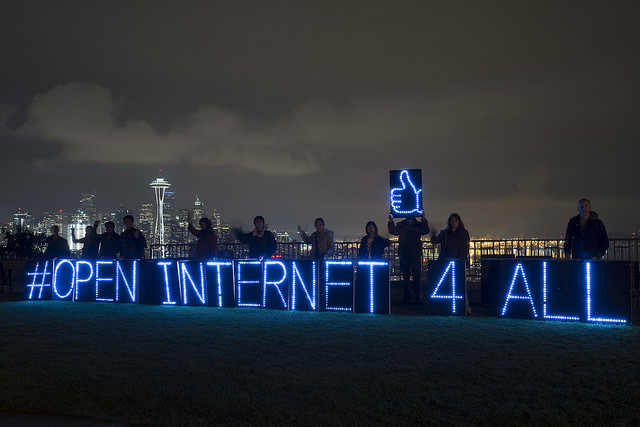
Ameen Hussaini
Staff Writer
In March, the Trump administration made clear that it intended to undo Obama era net neutrality rules. Although many people are aware that net neutrality is an important issue, many don’t know what it means and how it affects their lives.
Net neutrality is the idea that the internet should be treated as a public utility. Other public utilities include various types of energy (electricity and gas), transportation (planes and trains), and communication (phones and the internet). While different companies can provide these resources and services, as public utilities, they all must adhere to certain rules outlined by government organizations.
When it comes to the internet, the Federal Communication Commission (FCC) is responsible for the regulation of internet service providers (ISPs). According to the FCC website, the rules that currently protect net neutrality do not allow for blocking, throttling, or paid prioritization by ISPs.
Blocking is when users are prevented from visiting any legal content on the internet. Throttling is slowing down broadband speeds when trying to visit specific websites. For example, an ISP can’t intentionally make streaming on Netflix slower than streaming on YouTube. Paid prioritization is the opposite of throttling and offers a faster connection to certain domains, usually because they are affiliated with ISPs in some way.
These rules were established on Feb. 26 of 2015, when the FCC, then under the leadership of Tom Wheeler, approved the Open Internet Order, a measure pushed by the Obama administration. The ruling requires the FCC to treat internet service providers as common carriers and therefore renders the internet a public utility under Title II of the Telecommunications Act of 1996.
Ajit Pai was appointed as the chairman of the FCC in Jan. 2017 by President Trump. Mr. Pai has stated multiple times that he is in favor of reversing the restrictions placed on internet service providers.
Pai was one of the dissenting votes in the 2015 decision that established the regulation, and his stance has remained the same.
His argument is that while net neutrality is important, the rules are too strict and harm businesses. Pai has said that he is willing to hear arguments from the pro-net neutrality camp and meet with executives in the industry. However, he remains unwavering even when he faces questions from the public and Democratic members of the FCC.
“Make no mistake about it. This is a fight we intend to wage and a fight we intend to win,” said Pai in a speech that outlined his plan earlier this year.
It’s hard to imagine how the loss of net neutrality would affect the average internet user for two reasons. First, an open internet is the only internet consumers have ever used; net neutrality has been in place since the internet went public. Second, the additional freedom leaves internet speeds to the discretion of the ISP.
For example, AT&T currently offers free DIRECTV streaming to mobile phone subscribers. Without net neutrality rules, companies like AT&T could throttle or slow down speeds when accessing competing streaming sites like Netflix and Hulu to coerce their customers into using DIRECTV.
This is especially significant considering that many people have little to no choice in their ISP. According to the FCC, 76 percent of people only have one ISP in their area that provides industry-standard speeds.
The FCC has not made any decisions yet, and net neutrality still stands today. However, Pai has made his intentions clear, and the Trump administration supports him.
“We support the FCC chair’s efforts to review and consider rolling back these rules and believe that the best way to get fair rules for everyone is for Congress to take action and create regulatory and economic certainty,” said White House Press Secretary Sarah Huckabee Sanders in an interview with the Washington Post in July.
Only time will tell whether or not net neutrality is upheld by the FCC. The only certainty is that whatever decision is made will determine what exactly it means to be on the internet. If net neutrality is upheld, we will have access to the open internet as we know it. If not, we will have access to the internet as the ISP determines.










